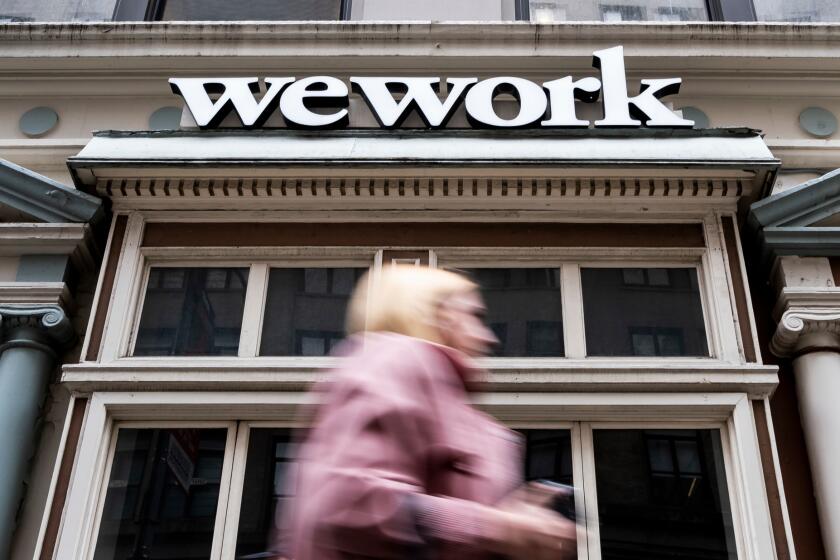WeWork IPO filing is a ‘masterpiece of obfuscation,’ analyst warns

- Share via
WeWork’s IPO prospectus lacks the information needed to create a financial model of the company, according to an analyst who specializes in new listings.
We Co., which is expected to raise about $3.5 billion in what would be 2019’s second-biggest initial public offering, must have put in a great effort to conceal the unit economics underlying the coworking-space provider, Triton Research Inc. Chief Executive Rett Wallace said.
“The prospectus is a masterpiece of obfuscation,” he said in an interview. “If the underlying facts were positive, why would a company go to so much trouble to prevent you from understanding them?”
Using what it calls an obfuscation index as one component of its ratings, Triton has built a strong track record predicting the winners and losers among technology IPOs. Since January 2018, listings that won an above-average score from Triton have risen about 92% from their offering prices, nearly triple the return of those scoring below average.
IPOs with the highest Triton scores include standouts Elastic, Smartsheet Inc. and Anaplan Inc., while post-listing duds such as Sonos Inc., Dropbox Inc. and Lyft Inc. rank among the low scorers.
I confided to a colleague that the WeWork IPO filing on Wednesday reminded me of a lower-stakes Mueller report. Truly.
Triton sees high levels of obfuscation in WeWork’s prospectus, filed last week. For example, the company stops counting sales and marketing expenses at a given location once the location has been open for two years — but the spending doesn’t actually stop after that. Instead, it counts as an operating expense, Triton said.
A representative for New York-based WeWork declined to comment.
WeWork’s IPO filing doesn’t disclose the dates of when its locations opened or when the spending at a given location will switch into the operating-expense bucket, according to Wallace. Like some government agencies, WeWork labels some compensation as investments.
“When you make it impossible for people to have data-driven conviction, then everything is just sentiment,” Wallace said. “Sentiment can come and go, especially in a volatile tape like this.”
The lack of disclosure becomes even more apparent when contrasted with other IPO filings that are more direct, he added.
“When companies fight you on understanding the basic proposition of the mousetrap, it’s always bad. People who have good mousetraps say, ‘This is the thing: You put the cheese in, the trap is designed to never break your thumb, and it catches mice nine times out of 10.’”
More to Read
Inside the business of entertainment
The Wide Shot brings you news, analysis and insights on everything from streaming wars to production — and what it all means for the future.
You may occasionally receive promotional content from the Los Angeles Times.











